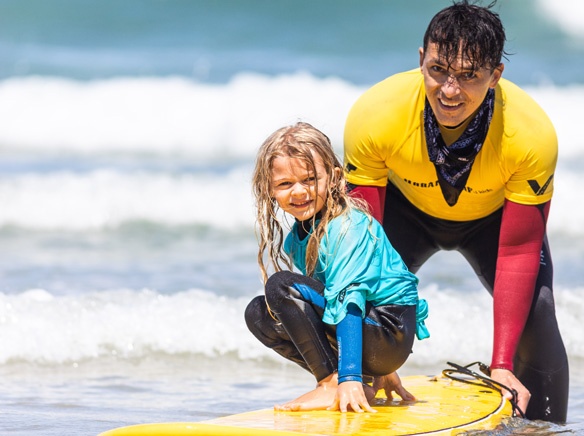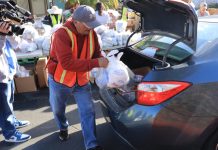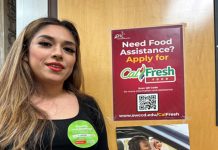What began as a few children on the beach with peanut butter and jelly sandwiches has grown into a substantial program for youth in foster care and at-risk communities, using therapeutic surfing as a conduit for impacted youth.
Urban Surf 4 Kids began its Surf Therapy Camps in 2011, and now one of its most successful and time-proven programs. Executive Director Roxanne Avant said that along with its other programs, they are changing the lives of foster youth every day and providing a safe and welcoming recreational and educational space.
“It is absolutely remarkable to witness the transformation,” said Avant. “And for Urban Surf 4 Kids we not only get to witness the transformation happen the day of the surf camp, but we get to watch it over time because we have so many kids in our groups that have grown up in our program. They come back every year. The come to every camp. We offer multiple programs besides surf therapy, so we get to watch them grow up and the transformation continues. It is absolutely a breathtaking experience to watch the moment that happens in the ocean, but it is life changing when you get to watch it over the course of their childhood.”
Surf Therapy Camps are open for youth 3-18 years old, and Avant said it works wonders with youth and deals with how they are feeling at that moment.
“If they are struggling with something in their life, or they battle anxiety, we can address that when they first arrive,” she said. “We try to transition them into a smooth and wonderful experience for the rest of their day. We partner them up with a volunteer from the community and that person becomes their surf mentor. We provide the wetsuits, surfboards, surf instructions, we create a safe space on the beach, we have music playing to reduce tension and create an experience almost like a family reunion or picnic out on the beach. It is a joyful experience.”
Avant said many times, kids in foster care do not have the option or opportunity to be in an organized sport.
“The beauty of adding surfing as a healthy outlet and a sport is that it is non-competitive. Our professionals are provided the safest experience possible for them and there is no moment where they have to say, ‘put me in coach,’ because they are all welcomed to get in the water,” she said. “When we are all in our wetsuits and rash guards, it feels like you are a part of something. That sense of agency where you feel like you are welcomed and feel that you belong, you feel included. That is particularly important for creating an equitable experience.”
Avant said the program starts with on-land instructions, stretch warmups and that they focus on every aspect of health and wellness, the lifestyle of being physically fit, and loving your body in creating an equitable outdoor experience like any other kid at the beach. Complete with its water safety team, several youths have aged out of the program and “graduated up” as volunteers giving back to the organization. Urban Surf recently hired its first two staff members, both that have lived the experience as former foster youths. She said that the team is appreciative providing loving experiences to the youth and that the program is free for the families, caregivers and youth.
“We partner with different nonprofits in the community, so we have a collaborative approach,” said Avant. “It is a concept that we adopted from the Hawaiian culture of Ohana, the Hawaiian word for ‘chosen family.’ We try to provide a family-like environment for them and try to create a community of love on the beach and surround them with positivity.”
Avant said through its programs, youth develop self-confidence, enhances their self-esteem, reestablishes trust, and allows them to develop friendships with their peers.
“The benefits and therapeutics of being able to go out into the water, catch that wave, stand on that board, while having someone there clapping and cheering for you every time that you do is such a confidence boost,” she said.
Avant said that in the past five years, it has expanded its programs to give more support, education, and a family environment to help foster youth with lifelong results. The Hanai Mentoring Program, Hanai meaning “an informal adoption of one into a family” is a seven month program for youth 7-18 years old where youth go in groups and do various outdoor activities.
“We go in groups with 10 kids, and 10 finger-proofed, trained mentors, and once a month the group will go and do an outdoor activity,” she said. “It could include hiking, kayaking, surfing, or sometimes they just have a picnic or hang out in our beautiful green spaces, our public parks, and introduce them to different outdoor experiences and have a constant interaction with them over an extended period. After five years, we have five groups and that is about 50 kids that participate monthly in these outings.”
Urban Surfs Dreaming of Aloha Achievement Program is a six month program for teens 14- 18, where 12 applicants, typically teenagers living in group homes take life-skills courses, tour a college campus, complete a financial literacy program, and are required to do two community service projects, giving back to the community.
“If they complete all these life skills and service projects, they then get an all-expense paid chaperoned group trip to Hawaii,” she said. “It is a jam-packed schedule complete with inspirational speakers, tour the University of Hawaii, and many outdoor based experiences from hiking to a waterfall, paddling and surfing in Hawaii. This is absolutely a life-changing program.”
Avant said what is unique with this program, is that after both service projects are completed, the youth become guides for its yearly day on the beach with visually impaired adults.
“This is a special surf camp we do in conjunction with the Encinitas Lion’s Club,” she said. “At the end of every summer, in September, we take the blind and visually impaired adults out to have a surf day. It is a long and hot day on the beach, but it is so empowering for the kids to see the different challenges that other people live with on a daily basis. It is inspirational.”
These youth also feed the homeless around Veteran’s Day.
“It was particularly impactful on our last one because a couple of the kids that went had lived in that homeless shelter at some point in their childhood,” she said. “They were able to come back and give back. This program was stopped during the pandemic this past year.”
Every week since January, Urban Surf goes to Spring Valley and teaches a six week program, teaching and introducing kids that live in group homes about different surf industry careers. This six-week program combines fitness experts, occupational therapy and influential guest speakers and business partners from the surf industry to introduce the history and culture of surfing, surfing 101, jobs and careers, strike mission inspiration as well as STEM related topics.
Avant said the COVID-19 pandemic created a problem with some of the programs but expects to have all the programs back up and running as soon as possible. She said the pandemic not only affected programs, but also put a dent into the organization’s fundraising efforts. Avant said the program is still thriving and one thing that has helped during the pandemic is that Urban Surf is now operating remotely. Although based in El Cajon, Urban Surf serves youth from San Diego and Imperial counties. To learn more about Urban Surf 4 kids visit www.urbansurf4kids.org.













